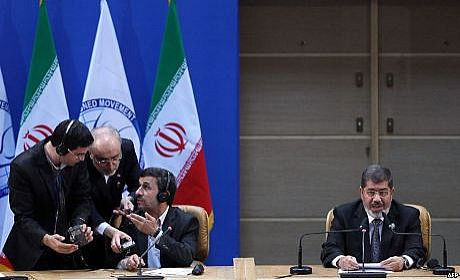Discussion Surrounding an Incorrect Translation

Foreign policy is defined as ways to pursue a political system's goals in an international atmosphere. In order to follow these goals, foreign policy has various devices, one of which is the media. From this aspect, the media is considered as an opportunity to deliver the diplomatic messages of a political system to the target society, whether society means the officials of a country (media diplomacy) or the people (public diplomacy). In both cases, the duty of the media - when defined within the framework of foreign policy - is to provide the grounds in order to facilitate the pursuit of the political system’s goals.
Due to this reason, the establishment of media like radio and TV stations and internet bases by foreign policy officials is an accepted matter which has been used by many countries. In this regard, the establishment of Radio Farda, Press TV, China's International Radio and tens of other examples can be mentioned which operate with this approach. In some cases, it is possible that the activity and approach of a media outlet is not necessarily beyond borders, but due to certain sensitivities and under very special conditions, the same media outlet would find its activities useful for beyond borders and directly or indirectly be transformed into the loudspeaker of a country’s foreign ministry and, in a completely "incidental" manner, affect its country's foreign policy; exactly like what happened with Iran's radio and television during the NAM Summit.
Review of the Events
A few days prior to the 16th NAM Summit in Tehran, foreign media outlets, especially Persian-speaking ones, started to attack the credibility of this summit. They tried to create doubt about the presence of the UN Secretary General and member countries and highlight security measures in Tehran and difficulties created for the people of this city. But, in addition to these issues, the presence of Mohammad Morsi, Egypt's president, by itself prepared the grounds for the focus of global media on this summit.
In this atmosphere, where the summit was held successfully and calmly, there were no grounds for the foreign media to continue their attacks. Suddenly, the action of one media outlet became a threat to the victorious foreign policy of the Islamic Republic, and the sweet taste of victory in this great test turned bitter, at least for a short time, for observers.
The incorrect translation of the summit’s Arabic language interpreter in Morsi's opening statements, which the head of Iran's Radio and Television called the "interpreter's mistake", led to the summoning of Iran's Chargée d'Affaires in Bahrain to this country's Foreign Ministry, and, due to an "interpreter's mistake", the Persian Gulf Cooperation Council issued a statement against the Islamic Republic of Iran.
An "interpreter's mistake" led to tens of analyses and interpretations on BBC Radio, Deutsche Welle, Al-Arabia, Jerusalem Post, Al-Jazeera, Independent, and tens of influential media outlets in the Arab world. Furthermore, Wikipedia, the internet encyclopedia, registered this incident in history by mentioning this issue in the article related to the 16th NAM Summit.
CNN and a Similar Experience
A similar incident to what was called an "interpreter's mistake" by the head of Iranian Radio and Television led to an official apology by CNN. In 2006, the incorrect translation of Mr. Ahmadinejad's statements on a live television broadcast led to the closing of CNN's office in Tehran. This office was reopened only when the network confessed to its mistake and apologized for it in an official statement.
Conclusion
The negative impact of media outlets on the Islamic Republic’s foreign policy is not only limited to this issue. Prior to this, Fars News Agency had ushered in waves of media attacks and denials in our foreign policy by publishing what it called an exclusive interview with Egyptian president Mohammad Morsi. But the damage done by the actions of these two media outlets is totally different. The damage caused by the so-called ‘Morsi’ interview was limited to the framework of Iran-Egypt relations, whereas the damage done recently gave Arab countries of the Persian Gulf region another opportunity to not only repeat their attacks against Iran, but to also display Iran as a country which would leave out no games or tricks on its path towards achieving its goals; even if these tricks might include using an interpreter.
It is at this point that we cannot simply put an end to this matter by just putting the responsibility on the shoulders of an interpreter, who certainly worked extremely hard during the summit, and, without taking any responsibility for what has happened, leave our foreign policy stranded to have to deal with the problems created in this regard.

